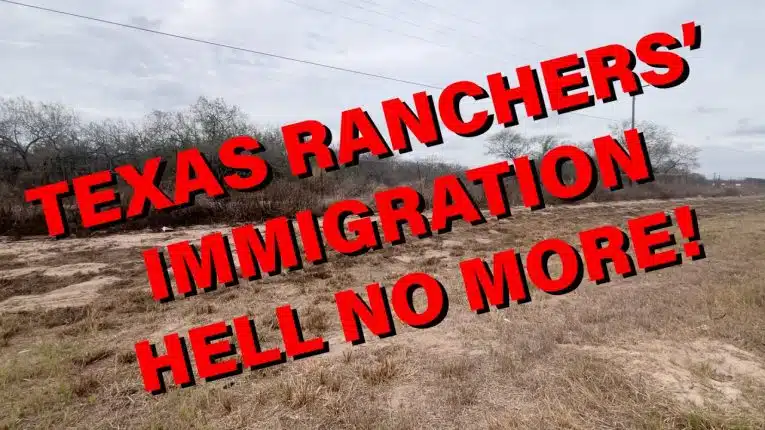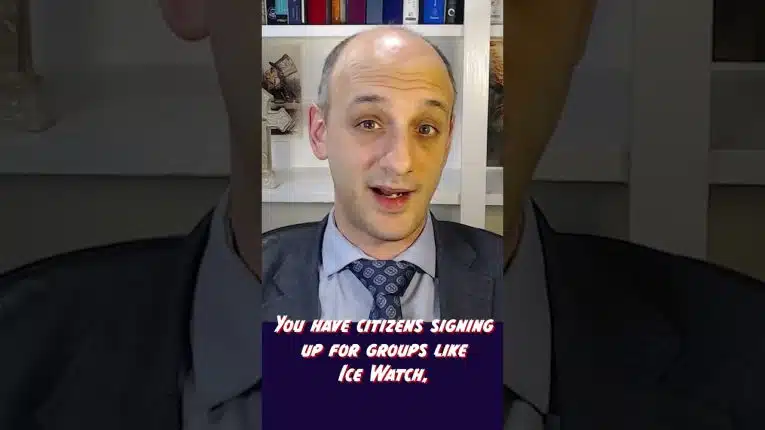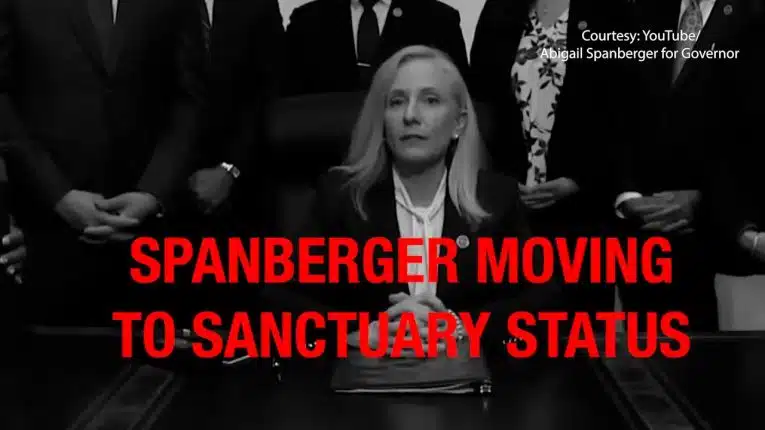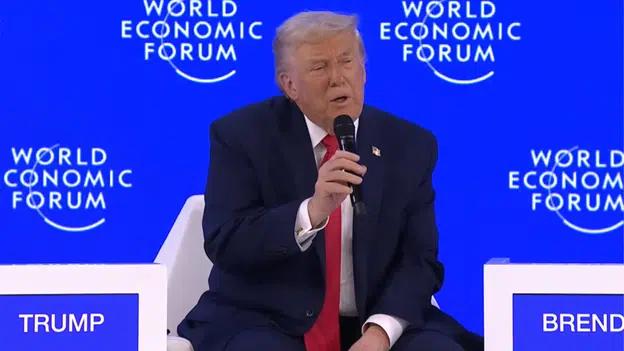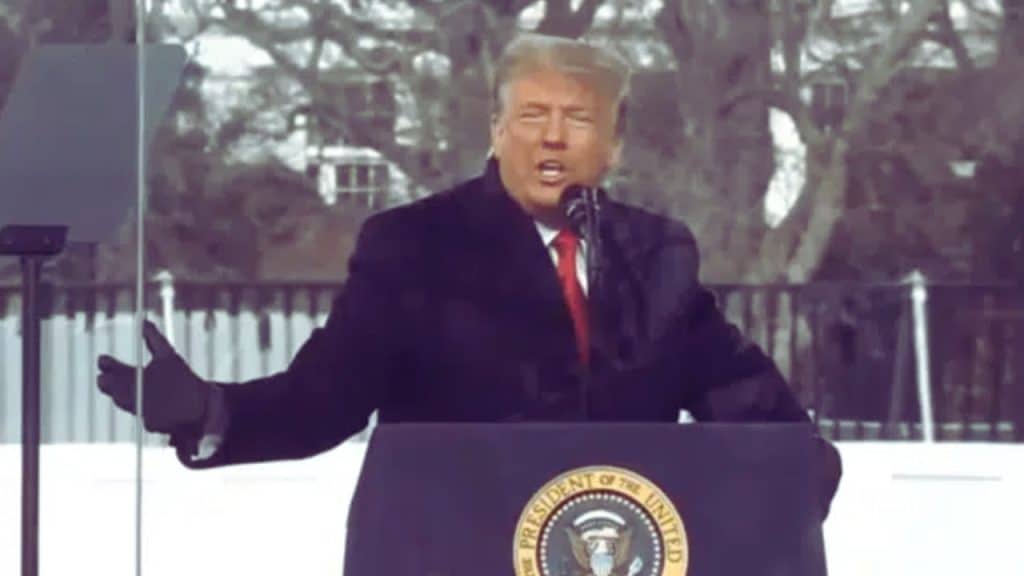
The Colorado Supreme Court voted 4-3 to remove former President Donald Trump from the ballot of the Colorado Republican presidential primary on Dec. 19 in a desperate bid to interfere in the 2024 election as Trump continues to lead incumbent President Joe Biden in national polls, ahead of Biden 47.2 percent to 44.2 percent, according to the latest average polls compiled by RealClearPolitics.com.
The ruling attempts, without any criminal charge of insurrection even being brought against Trump in any jurisdiction anywhere, let alone proving it beyond a reasonable doubt with a conviction, that the state of Colorado — and presumably any other state — can just declare whoever they want to be a rebel traitor to the country and therefore not qualified to stand for election under Section 3 of the Fourteenth Amendment.
In this case, the question was whether Trump’s Jan. 6, 2021 speech at the National Mall where he called for supporters to “peacefully and patriotically make your voices heard” preceding the riot at the U.S. Capitol was an insurrection for which Trump could be disqualified over without any trial or conviction.
Under the Fourteenth Amendment’s Section 3, it states “No person shall … hold any office, civil or military, under the United States … who, having previously taken an oath … as an officer of the United States … to support the Constitution of the United States, shall have engaged in insurrection or rebellion against the same, or given aid and comfort to the enemies thereof.”
The ruling states, “A majority of the court holds that President Trump is disqualified from holding the office of President under Section Three of the Fourteenth Amendment to the United States Constitution. Because he is disqualified, it would be a wrongful act under the Election Code for the Colorado Secretary of State to list him as a candidate on the presidential primary ballot.”
It did so, remarkably, by ruling that “Congress does not need to pass implementing legislation for Section Three’s disqualification provision to attach, and Section Three is, in that sense, self-executing…” even though Section 5 of the Fourteenth Amendment states, “The Congress shall have power to enforce, by appropriate legislation, the provisions of this article.”
Read that again, Congress—not the state of Colorado—”shall have power to enforce, by appropriate legislation, the provisions of this article…”
Before the Fourteenth Amendment was even ratified in 1868, Congress had already supplied a procedure for disqualifying former Confederate officers and soldiers from running for public office in the First Military Reconstruction Act of 1867. The disqualification required military tribunals, speedy trials and convictions, also ratification of the Fourteenth Amendment in order for states to be readmitted to the Union.
This was enforced in part by the Enforcement Act of 1870, which provided in Sections 14 and 15 for federal prosecutors to bring cases that would remove individuals from holding public office if they had participated in the Confederacy. It was not self-executing, it required convictions.
Section 14 stated, “That whenever any person shall persons hold office, except as a member of Congress or of some State legislature, contrary to the provisions of the third section of the fourteenth article of amendment of the Constitution of the United States, it shall be the duty of the of the district attorney of the United States for the district in which such person shall hold office, as foresaid, to proceed against such person… [in] the circuit or district court of the against by United States in such district, and to prosecute the same to the removal of such person from office.” Here, Congress was explicitly holding onto its own power to disqualify its own members, and of states to do the same. Under no reading, however, would this provision have applied to the President, to be removed, since that is covered under impeachment, removal and disqualification as under the Constitution. In this case, officers of the United States, that is, federal employees, could be removed from office if they were later tried and convicted of participating in the Confederacy.
Section 15 provided that upon conviction, a person who had participated in the Confederacy and held public office and was removed, would be guilty of a misdemeanor, imprisoned for no more than a year and fined no more than $1,000.
When it came to removing the former Confederates’ disability of running for public office, that was once again Congress. Congress had already removed political disabilities for 4,616 former Confederates by March 1871. And then, with the Amnesty Act of 1872 to remove all political disabilities “except Senators and Representatives of the Thirty-sixth and Thirty-seventh Congresses and officers in the judicial, military, and naval service of the United States, heads of Departments, and foreign ministers of the United States.”
And again, in 1896, it was Congress who voted to allow former Confederate officers to rejoin the U.S. armed forces. And in 1898, the Section 3 bar was removed completely by Congress. Every time, this was done by two-thirds votes required of Congress to remove the political disabilities under Section 3.
So, during Reconstruction, it was the military districts who would try rebels that were in military captivity. And afterward, if a member of the Confederacy were in the federal civil or armed services, it would be federal prosecutors who would bring a charge and seek conviction and removal of said officers, all under processes Congress established.
But that’s not stopping the Colorado Supreme Court from recklessly pursuing an undemocratic process, even as the court freely admitted it was in “uncharted territory,” stating, “We are also cognizant that we travel in uncharted territory, and that this case presents several issues of first impression…” No kidding.
Mercifully, however — and as noted by Viva Frei on X.com (formerly Twitter) — the court also stayed their own opinion until Jan. 4, 2024, and “If review is sought in the Supreme Court before the stay expires on January 4, 2024, then the stay shall remain in place, and the Secretary will continue to be required to include President Trump’s name on the 2024 presidential primary ballot, until the receipt of any order or mandate from the Supreme Court.”
So, at the moment, the ruling has no effect and is stayed until Jan. 4, 2024, and if Trump appeals the decision to the Supreme Court — CBS News reports a campaign spokesperson stated that Trump will be appealing — then the stay remains in effect, and Trump will appear on the March 5 Republican presidential primary ballot.
Either the Supreme Court will hear that appeal, or if it doesn’t, pending the appeal, Trump will appear on the ballot on March 5. And then, after the primary has already occurred, the Court might come back and declare the issue to be moot, or given the imminent 2024 general election, come back and have to rule on whether Trump can appear on the general election ballot should he win the Republican nomination.
So, it might not even work, making the exercise by the Colorado Supreme Court a sop for political Democrats who simply do not want to face the strongest candidate in the Republican field, Trump, as the state’s highest court kicks the issue to the Supreme Court begging it to instead make a decision on this, knowing it is likely to be overturned. Cynically, then Democrats in more sops can pretend that it was a Republican-majority appointed Supreme Court that had allowed Trump to remain on the ballot.
Responding to the ruling by the Colorado Supreme Court, House Speaker Mike Johnson (R-La.) on X.com (formerly Twitter) stated on Dec. 19, “Today’s ruling attempting to disqualify President Trump from the Colorado ballot is nothing but a thinly veiled partisan attack. Regardless of political affiliation, every citizen registered to vote should not be denied the right to support our former president and the individual who is the leader in every poll of the Republican primary. We trust the U.S. Supreme Court will set aside this reckless decision and let the American people decide the next President of the United States.”
Johnson is right. The Supreme Court would need to act with haste to overturn this decision — and I would add would need to make it unanimous to remove any doubt as to the outcome.
This is so dangerous to our nation. As George Washington University Law School professor Jonathan Turley stated on Fox News on Dec. 19, “This country is a powder keg and this court is just throwing matches at it… [F]or people that say they are trying to protect democracy, this is hands down the most anti-democratic opinion I’ve seen in my lifetime.” Turley also called it a “slippery slope” for partisans to “shortcut” elections by removing their opponents from the ballot on specious grounds.
Turley is also right. With more than 25 states variously hearing lawsuits on Trump’s qualification — he’s a natural-born citizen over the age of 35 as is required under the Constitution, but what do they care? — the Supreme Court will likely have to intervene to settle these questions. Its choices are obvious, cast the country into the abyss of undemocratic shitholes around the world, or overturn the Colorado Supreme Court and uphold the obvious text of the Constitution and preserve the civil society.
I do believe this is being done intentionally to provoke a response. Cool heads must prevail! The last time the civil society and liberty was lost it was not recovered for more than a thousand years.
And as for Republicans considering what to do in the 2024 primary, supporting Trump might increasingly be viewed as the only antidote for what is happening here, the only leader who might stand up to an entrenched establishment. At this point, it is a matter of self-preservation for the civil society more than anything.
Robert Romano is the Vice President of Public Policy at Americans for Limited Government Foundation.


